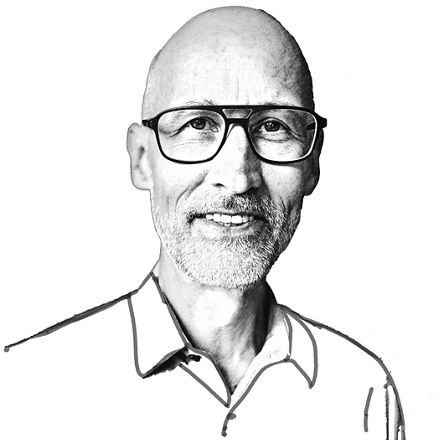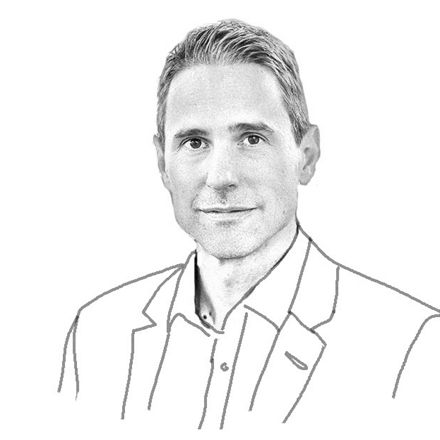Ms. Schnelle, the German economy grew by approximately 14 percent over the past decade. During the same period, we have managed to reduce our CO2 emissions by 29 percent. Will it be possible to get a grip on the climate crisis with the help of innovations and under conditions of economic growth?
Schnelle It certainly will. Many measures have been initiated, and they are pointed in the right direction. As a high-tech startup fund, we have been financing innovative startups for the past 19 years. Many of them are in the area we call “climate tech” today. These companies would like to forge ahead with the transformation even faster, but in my opinion the momentum they are creating for the energy transition is already very impressive.

Paech I doubt whether these figures are correct. If we take into account the displacement of emissions to other countries as well as all the effects of the crisis, I don’t think a reduction of greenhouse gas emissions has really been achieved through technical progress. A huge reduction of CO2 emissions was registered, and can always be registered, when commerce and industry are at a low ebb. During the periods when CO2 emissions in Germany decreased without empirical trickery, it was due to the collapse of the GDR, the financial crisis in 2008/2009 or the coronavirus pandemic. Up to the present day, there has been no really watertight example of a technology that has solved an environmental problem if we calculate in all of the spatial, time-related, material, and displacement effects of the technology that was used for this purpose. I would even go one step further: Technological innovations in the area of climate protection are starting to become an environmental threat.

How do you come to that conclusion?
Paech Twenty years ago I argued that it wouldn’t be possible to use technical innovations to decouple the growth of the gross domestic product from environmental damage. Today I’m going further and saying that the energy transition is destroying the last remnant of cultural landscapes, and of biodiversity in particular, without any significant reduction of carbon dioxide emissions resulting from the technologies that are being used. And we haven’t even talked about the many practical problems such as transmission networks, energy storage systems, and so on. Besides, I think the idea of converting present-day industry to run on electricity and hydrogen is science fiction.
Schnelle For my part, I have more confidence in progress and economic growth! As a generalist fund, we invest in diverse areas, such as the development of medicines and financial innovations. But we are also involved in environmental technologies as well—with good reason. Today we are reaping the fruits of what we sowed years ago. For example, in 2011 we invested in the startup Kiwigrid. This company has developed a powerful platform for decentralized energy management—in other words, a kind of operating system that creates a link between different renewable energy sources, such as photovoltaics, energy storage units, energy networks, and e-mobility. Back then, this kind of investment was clearly not yet in vogue. Later on we sold our shares very successfully to Innogy, LG, and the Quandt family, which stands behind Solarwatt and BMW. Today these are significant players that are helping to ensure grid stability—one of the challenges you’re talking about.
The incentive for companies to forge ahead with such solutions lies in making a profit with these technologies—which implies value enhancement and thus economic growth. How are we supposed to manage the departure from a fossil-based economy if this incentive mechanism is discontinued?
Paech In a post-growth economy, which I recommend, we will still need technologies such as decentralized energy management systems and virtual power plants. But if technologies are expected to simultaneously induce growth, we’ll be throwing the baby out with the bathwater.
According to the German federal government, half a trillion euros flowed into the energy-related refurbishment of the country’s existing buildings from 2010 to 2018. Half a trillion! According to an institute based in Berlin, this reduced the greenhouse gas emissions in this area by only 2.7 percent. But how many additional emissions are being generated by the demand effect now that these half a trillion euros are increasing the income of many individuals? It’s more than likely that the savings effect of this technological solution is being overcompensated many times over. That’s why I take a critical view of the promise that rates of return and shareholder value can bring about a breakthrough for “good” technologies. As for me, I’m a co-founder of an energy cooperative that approaches this issue in a completely different way, because it’s supported by people who say “We want climate protection” rather than “We want to get rich.”

Do the people behind the startups you invest in primarily want to get rich, Ms. Schnelle?
Schnelle I’d suggest that every founder of a new company hasn’t got dollar signs in his or her eyes. The primary incentive is not a good rate of return. The entrepreneurs we support are very strongly driven by their sense of a mission; they want to do something better than it’s been done before. Many of them are consciously committed to issues such as the circular economy in order to change something. As a rule, they decide to take on investors like us if they aren’t getting any borrowed capital from a bank or if they aren’t managing to advance their development without external capital.
Paech The problem is obvious: Innovations always bring something extra into the world. And even something intangible such as digitalization has environmental consequences—just think of the tremendous additional power consumption of ever-growing data centers! Instead of forging ahead with new technologies, which result in complexity, modernization stress, and uncontrollability, we should set our sights on another form of change: exnovation. It gives us an answer to the question “How can we get rid of things that were originally innovative but became a problem quite a while ago?”
Does that mean we should do away with electric cars and smartphones, wind turbines, and solar panels?
Paech An energy transition that is worthy of the name requires technologies too—I won’t deny that. But it primarily requires conservation, and at the moment we are running the risk that an insane belief in progress—I have to express this so unscientifically—is creating an alibi for not approaching the problem at points that are much more important: namely, reducing traffic, initiating a transformation of agriculture, not building any additional houses, and setting limits on digitalization and consumption. In addition, we have to ask ourselves whether it’s possible for society to innovate itself to death by surrounding itself with technologies that are no longer controllable.
Schnelle In my view, that’s too broad a generalization. For example, we’ve invested in Ineratec, a company that produces synthetic e-fuels for ships and airplanes. I can’t imagine what aspect of it would be detrimental. Another company, Traceless Materials, produces biodegradable plastics. It’s making an important contribution to the circular economy and helping to reduce resource consumption. Instagrid is developing a portable battery that can replace diesel generators. I too can see many of the problems you mention. But I’m convinced that innovations are contributing to their solution.

Is it possible that there are also “good” innovations in addition to the “bad” ones, Mr. Paech?
Paech I don’t want to condemn developments like the ones you’ve just mentioned as examples. However, I basically believe that social innovations are the most important ones. How can we successfully reorganize the use of goods and technology without adding material infrastructures? I’m an advocate of agriculture that is based on solidarity and managed in small units in a decentralized, small-scale, needs-based manner. As a social scientist, I’m interested in cultural change inside niches—and that’s where we’re on the same page, Ms. Schnelle:
Technological innovation processes also begin in niches and are subsequently diffused throughout the world. Incidentally, this also works with very small amounts of capital investment. For example, in Switzerland the Revendo company, which reconditions and resells used Apple devices, has expanded. This innovation is more labor-intensive than capital-intensive. It doesn’t reject technology, but it serves to reduce output. We need a national economy in which more manual skills and more agricultural labor carried out under humane conditions are once again playing a role. The high-tech strategy that we have pursued for decades has unfortunately not made the world any better.
Schnelle That may be true of some sectors in industrialized countries. But if you look at the global South, the perception there is very different. The invention and dissemination of mobile phones in Africa has greatly improved very many individuals’ opportunities for development and participation, because they’ve been able to skip the stage of physical telephone and data networks.
For artificial intelligence as well, I reckon that its potential utility is significantly higher than its risks. For example, predictive maintenance is easing the transformation process in the mechanical engineering sector and in heavy industry. In medicine as well, tremendous progress is possible thanks to artificial intelligence. The startup Algnostics—a spinoff from the Charité Hospital in Berlin—uses artificial intelligence to analyze large volumes of tissue samples, for example. That makes it possible to develop therapies faster and adapt them more precisely.

Paech That may be, but it only helps to promote the supposedly optimized continuation of the growth paradigm. We’ve long since reached a situation in which the substantial basis for further economic growth no longer exists. The growth of technical infrastructures is competing with physical spaces and resources that are needed for food production. The more technology we develop and implement, the more we consume the resources that fulfill the basic needs of human beings. The loss of biodiversity and physical spaces that we can still use for agriculture outweighs the advantages—and that goes for Africa as well. Young people in Africa ought to primarily work in agriculture and the trades instead of risking their lives in coltan mines—for our smartphones!—or setting out for Europe because they fall for promises that cannot be fulfilled.
However, technology can also help to prevent such developments. For example, Evonik has helped to set up a business incubator in Rwanda. The startups there are addressing local issues first. In this way they are preventing high-capital companies from other parts of the world from going there and taking the profits. Apart from that, you’re talking about “more and more” technology that is becoming a problem. But in the case of many innovations, it’s all about “better” technology.
Paech “Better” or “more valuable” innovations add new solutions, but also new side effects, dependencies, and risks. If such innovations then bring additional revenue, the demand for them grows and consequently goods production grows as well.
Ms. Schnelle, how can this dilemma be resolved?
Schnelle The only resolution I see is entrepreneurship—even though nowadays I wouldn’t want to be the head of a corporation or a midsized production company, with such high energy costs and all the questions related to future viability. We’re facing a gigantic challenge, because our prosperity is under threat.
Paech I should hope that our prosperity is under threat because it is decadent. In Europe today we are generating twelve tons of CO2 emissions per capita per year. We have to reduce that to one ton if we want to have eight billion people staying within environmental boundaries and living under conditions of global justice. That would also help to combat the degradation and alienation to which the industrial model has led us.

Today nobody understands this overly complex world any more. I used to repair my cathode-ray tube television by myself. Today we are dependent on fate, and helpless. All we can do is to buy even more complex products and hope that everything works. This downside of the industrialized society can also only be overcome if we design it on a more modest scale.
Schnelle Of course we are operating in a super-complex world, and as a fund we too have to ask ourselves again and again which issues we are investing in. All of us would certainly be well advised to be a bit more moderate. However, entrepreneurship and innovation are the only path toward progress for humankind. After all, we can’t simply order people to do without innovations. How is that supposed to work?
Paech A dictatorial authority that would prohibit innovation processes is an unrealistic concept. We need a process of enlightenment that’s critical of progress, and a cultural transformation; crises will take care of the rest. Nevertheless, there’s nothing objectionable about entrepreneurs who base their success on quality and on the genuine usefulness of their products. In that case, the sales value is only the means to an end, and in the best case to an appropriate cost coverage. Such a reversal of means and ends would be part of an appropriate entrepreneurship that doesn’t develop good ideas for the sake of profit. I’d like to say one more word about the nature of innovation. Dirk Baecker, a former colleague of the great sociologist Niklas Luhmann, once said, “We need innovations so that we don’t have to change ourselves.” That should be kept in mind before we rush into adventures that are becoming increasingly unpredictable, only in order to save a prosperity that is beyond saving.



